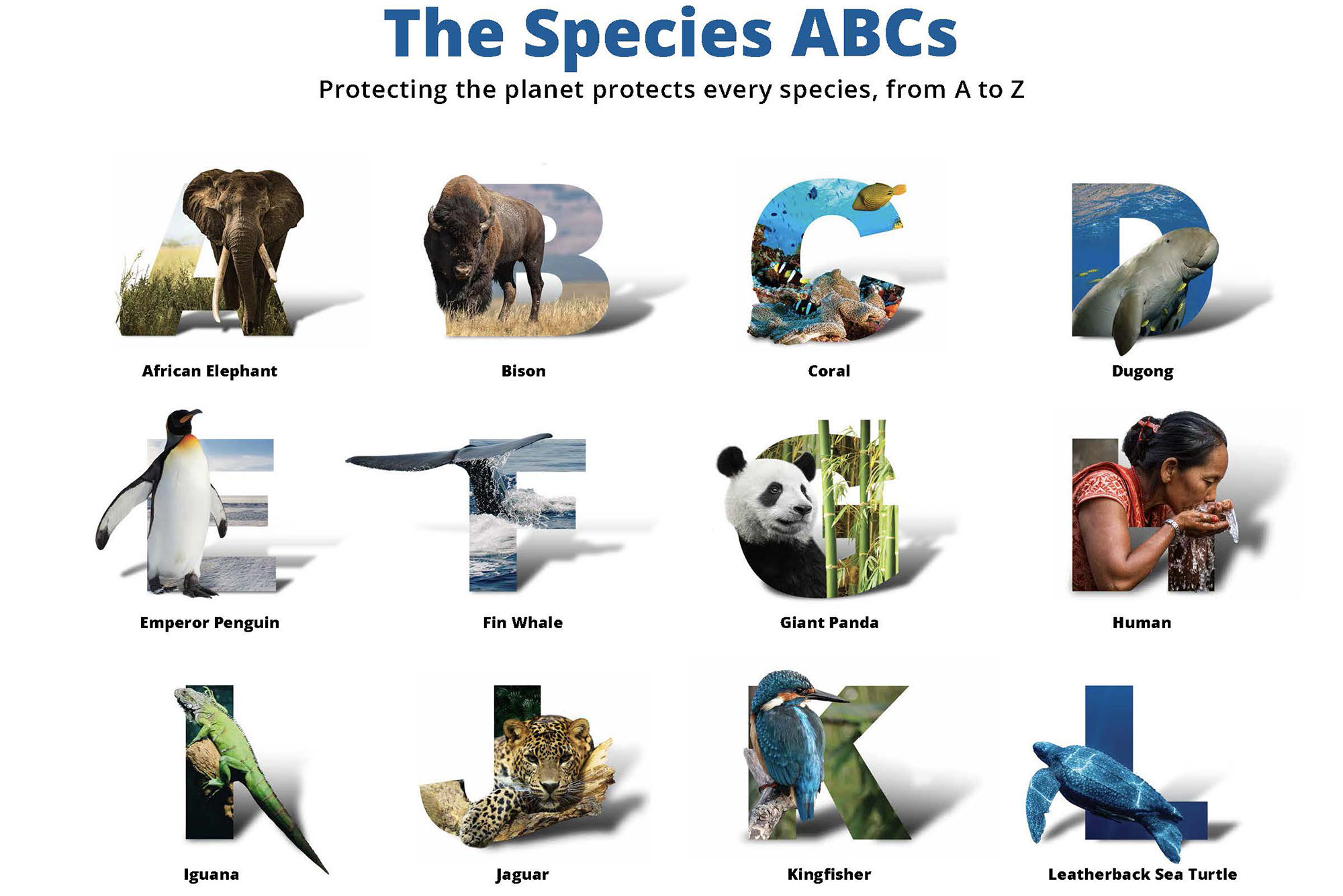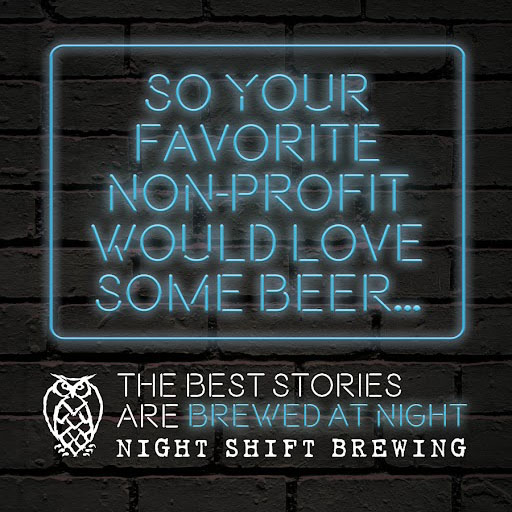COM Students Create Successful Marketing Campaigns for Night Shift Brewing and World Wildlife Fund

A selection of the professional work produced by College of Communication students in their advertising portfolio classes. They have since graduated and now work in the industry. Photo courtesy World Wildlife Fund
COM Students Create Successful Marketing Campaigns for Night Shift Brewing and World Wildlife Fund
Work began as class assignments in advertising portfolio classes
Imagine being paid for your homework.
Every year, students in the College of Communication’s CM423 and CM424 advertising portfolio classes are asked to dream up creative work for real-world clients, albeit with lower stakes: These are imaginary campaigns, and the “client” will never see the finished work. But students come out of the classes with portfolio pieces that showcase their talents in art direction, copywriting, and strategy, crucial for landing those first internships and jobs.
However, two recent projects were so stellar that Doug Gould, a COM professor of the practice of advertising and longtime industry pro, knew they had professional potential.
“The work was so impressive that I said, ‘I don’t know if we’ll be able to sell this idea, but it’s so good, we need to get it in front of the client and see if they are interested,’” Gould says.
His instincts were correct: student work created for the World Wildlife Fund, the world’s largest conservation organization, and Night Shift Brewing, located in Everett, Mass., have now become actual campaigns for the clients. And the students, who have now all graduated and are working in the industry, were paid as freelancers.


Photos courtesy World Wildlife Fund
One of Gould’s assignments called for students to choose a nonprofit they were passionate about, and then craft a campaign to market it. Caroline Richardson (COM’21) and Amanda Berman (Questrom’21) began their WWF campaign in the spring of 2021.
Richardson, now an associate art director at TBWA\CHIAT\DAY, and Berman, currently an art director at RAPP, say they chose WWF as their hypothetical client for several reasons, among them the organization’s large reach. They also both happen to be animal lovers.
Their project, which officially launched in March 2023, is a set of gorgeously illustrated alphabet flashcards for elementary school children that intertwines letters and animal photographs (“A” is for African elephant, “B” is for bison, “C” is for coral, etc.) on one side, and a short description of the animal on the back. The flashcards are being used in more than 1,000 classrooms throughout the country as part of WWF’s Wild Classroom program, which provides free resources to guide teachers in developing lessons about conservation.
To get their concept in front of the WWF, Gould cold-messaged the organization’s art director on LinkedIn. The strategy worked. “We hopped on a bunch of Zooms with [the art director] throughout this process, and he was really great at showing us things that we weren’t super well versed in, such as photo editing techniques,” Richardson says.
The client also helped focus the concept. “Our original idea was more adult-oriented, and was designed to appear on subway posters,” Berman says. It was conversations with the client that led to the illustrated cards.
Richardson and Berman’s work recently won a Young Ones prize, given for outstanding student design and advertising work, as well as a Hatch award, which recognizes creative branding and marketing created in New England or for a New England client.

In spring 2022, Gould assigned his students to choose a microbrewery and create a campaign to help grow its business. Classmates Hannah Glickenhaus (COM’22), India Pearman (COM’22), and Olivia Strauss (COM’22) say they chose Night Shift Brewing because they were impressed with the company’s existing branding and were familiar with the product, having seen it at the BU Pub, as well as at local bars.Each ad in their campaign starts with the words, “So you…” and ends with a funny, head-scratching conundrum: “So you dropped your ballpark frank and still ate it,” “So you tried to adopt a squirrel on your walk home.” The tagline for each ad reads, “Not every idea brewed at night is a good one. We are. Night Shift Brewing.” The campaign launched on social media in March 2023, and digital billboards featuring the ads published around Boston this month.
Originally, the trio pitched the “So you…” lines as raucous moments that happen when you’ve had too much to drink. When they pitched the idea in class, Gould encouraged them to find funny moments that could happen even without a drink, in an effort to make the campaign more relatable…and legally less problematic, Strauss says.
Gould had a mutual friend at Night Shift and was able to find the contact info for the company’s founder, Michael Oxton, who loved the work. Oxton and his team then worked with the students to develop the campaign.
“We landed on the premise of the idea—‘The best stories are brewed at night’—through our conversations with Michael,” Strauss says. “From the first week we pitched the idea in class, to the end of the freelance campaign, it’s unrecognizable,” says Glickenhaus, currently working as a junior copywriter at MMB in Boston. “It went through a lot of iterations, for sure.”
“We sold the idea to them to use in any capacity they want,’ Pearman says. “And they told us it’s going to live on as an evergreen campaign for them, and they can apply it to product launches or events they have.” Their idea was short-listed for this year’s Young Ones award.
“Honestly, it’s just a brilliant campaign idea,” says Oxton. “It connects what we do and our origin story [homebrewing at night] to funny, relevant anecdotes that everyone can identify with. The best campaigns are ones where people think, ‘Oh I gotta take a picture of that!’ or ‘Oh I gotta share that!’ and I think this campaign achieves that. It’s also constantly refreshable—there are nearly limitless examples of funny, great stories or ideas that people ‘brew’ at night. Everyone identifies with it. We love it.”
Beyond the classroom, students say their COM portfolio classes prepped them for life in the advertising industry, teaching them, for example, how to negotiate pay as a freelancer. And the pieces they produced helped them land that all-important first job.
“In my interview for my current job [as a copywriter at RPR in Santa Monica], the hiring manager said, ‘I called you because I saw your Night Shift Brewing campaign in your book, and I think that’s really great work,” Strauss says. “The campaign jump-started my career.”
Pearman, currently an associate social strategist at Digitas in Boston, says Gould’s feedback wasn’t dictatorial, but rather made the students think. “The class emulates real-life professional work because it’s all feedback based, and then you develop your idea further,” she says. “That’s the same process we do over and over in our day-to-day lives.”
“Our goal is to have our students be as creative as possible—not to create middling advertising, which the world is full of, but to demonstrate that they can produce at the highest possible levels given their relative lack of experience,” Gould says. “We often have students create work that is every bit as good as what is made in the professional environment.”

Comments & Discussion
Boston University moderates comments to facilitate an informed, substantive, civil conversation. Abusive, profane, self-promotional, misleading, incoherent or off-topic comments will be rejected. Moderators are staffed during regular business hours (EST) and can only accept comments written in English. Statistics or facts must include a citation or a link to the citation.